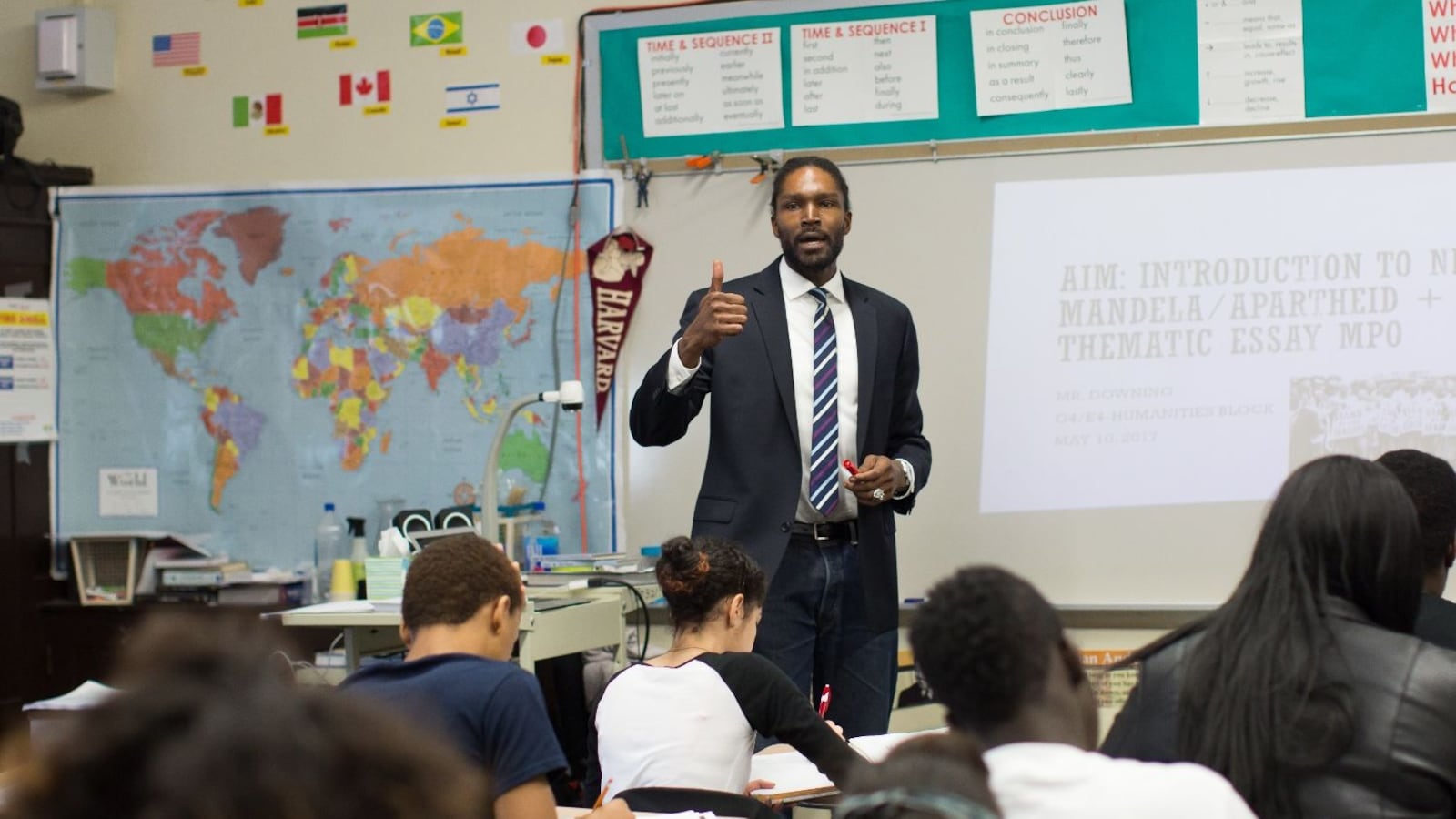Kelly Downing had a problem: student jitters.
A 10th-grade humanities teacher at Harlem’s A. Philip Randolph Campus High School, he struggled to persuade his students to present their work in front of the class.
So Downing tapped into his students’ interest in social media, inventing a game he calls “Facebook Live.” Now, when he asks students to write and present paragraphs on specific ideas — complete with topic sentences and supporting evidence — he calls out, “Who is ready to go live?” and invites a student to present in front of an imaginary camera.
“They lose sight of the traditional sense of presenting and let their guard down,” Downing says. When they present, students are required to read their work without stumbling or repeating words. The friendly competition that emerges “allows students to make mistakes in a way that doesn’t cause them to shut down and be embarrassed.”
In this installment of “How I Teach,” we asked Downing, himself a product of New York City public schools, to explain his tips for getting students’ attention and why he thinks more men of color should be in the classroom.
Why did you become a teacher?
I became a teacher due to the underrepresentation of African-American males in education. As a teacher, I am able to draw from my life experiences to impact lives.
What does your classroom look like?
My classroom is a reflection of my students and myself. There are walls that are adorned with student work that not only reflects the highest grade, but the hardest effort as well.
There is a string of college banners that hang across the lockers in the back of the room like eyelashes as a reminder to students to think big. At the very front of the room, a sign I made reads, “I AM A SCHOLAR; ALL DAY … EVERY DAY!” because I expect students to put forth their best effort and apply themselves wholeheartedly. A student’s artwork hangs over the entrance to our room. It reads, “SQUAD 313.” Aside from the fact that we are located in Room 313, it reminds us that we are on this journey together.
Fill in the blank: I couldn’t teach without my ________.
Assorted Chisel Tip Expo Dry Erase Markers. Apparently, I can only write straight and legibly on the dry erase board using a chisel tip marker.
What is one of your favorite lessons to teach? How did you come up with the idea?
I enjoy using social media to teach students the importance of public speaking, proofreading, editing and revising. The lesson is called “FB Live.” Students are asked to construct a well-written paragraph (one that is grammatically correct and includes a topic sentence, supporting sentences and a concluding sentence) in response to a question or quote.
After students have had the chance to write and review their paragraph, they can raise their hand and request to “Go Live.” Once the class counts down, students must read their response as if they are on Facebook going live or being recorded on camera. If the student messes up or trips over a sentence, he or she must start over and “Go Live!” again. Students love social media; they appreciate lessons that connect and resonate with them.
How do you respond when a student doesn’t understand your lesson?
I assess where the breakdown is occurring. I will often attempt to use metaphors from pop culture, music, television and media to reinforce concepts and ideas. I try to provide multiple points of entry.
How do you get your class’s attention if students are talking or off-task?
Depending on the situation, I might use the “cat’s-got-my-tongue” technique whereby I just stop talking until I have the attention of the class, or I might have to use the “laser beam” whereby I lock eyes with the culprits and gesture to cut the inappropriate behavior.
How do you get to know your students and build relationships with them? What questions do you ask or what actions do you take?
I talk with students and pay attention to their verbal and nonverbal cues. I ask students how they are feeling. I constantly tell them that I believe in them; they were born to fulfill a specific purpose in life. After-school tutoring and mentoring has definitely helped to build stronger relationships with my students.
What’s the best advice you ever received?
The best advice I received was given to me by my mom, who told me, “While taking care of others, be sure to take care of yourself.”


